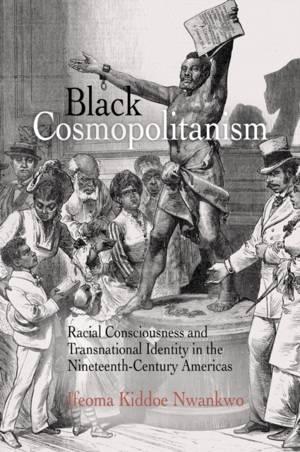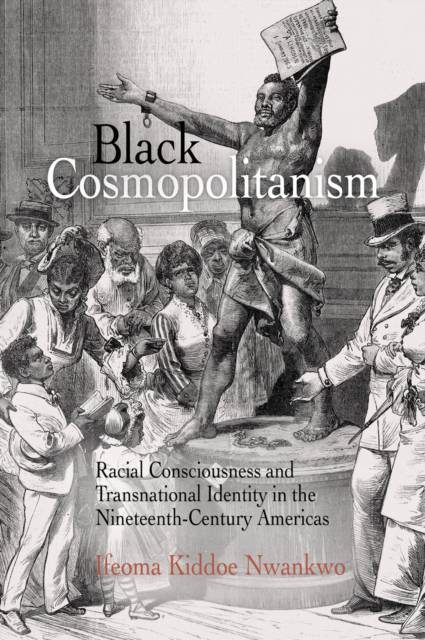
- Retrait gratuit dans votre magasin Club
- 7.000.000 titres dans notre catalogue
- Payer en toute sécurité
- Toujours un magasin près de chez vous
- Retrait gratuit dans votre magasin Club
- 7.000.0000 titres dans notre catalogue
- Payer en toute sécurité
- Toujours un magasin près de chez vous
Black Cosmopolitanism
Racial Consciousness and Transnational Identity in the Nineteenth-Century Americas
Ifeoma Kiddoe Nwankwo
60,95 €
+ 121 points
Description
Black Cosmopolitanism Racial Consciousness and Transnational Identity in the Nineteenth-Century Americas Ifeoma Kiddoe Nwankwo "Black Cosmopolitanism seeks to tell a story about the complex hemispheric context in which multiple public discourses of blackness emerged in the work of black intellectuals, writing and publishing throughout a nineteenth century shaped by the cataclysmic impact of the Haitian revolution . . . [The book reflects] the richness of new pathways in a hemispheric American studies, moving outward to explore philosophies of race and histories of racial identity that traveled back and forth between colonial and imperial worlds."--American Literature "Black Cosmopolitanism presents a strong, innovative case for looking back in order to look forward. . . .Nwankwo's book highlights its relevance to a varied cross section of disciplines that include, but are not limited to, African-American Studies, Caribbean Studies, Latin American Studies, Afro-Hispanic Literature, and History of the nineteenth, twentieth, and twenty-first centuries."--Journal of Haitian Studies What are the perceived differences among African Americans, West Indians, and Afro Latin Americans? What are the hierarchies implicit in those perceptions, and when and how did these develop? For Ifeoma Kiddoe Nwankwo the turning point came in the wake of the Haitian Revolution of 1804. The uprising was significant because it not only brought into being the first Black republic in the Americas but also encouraged new visions of the interrelatedness of peoples of the African Diaspora. Black Cosmopolitanism looks to the aftermath of this historical moment to examine the disparities and similarities between the approaches to identity articulated by people of African descent in the United States, Cuba, and the British West Indies during the nineteenth century. In Black Cosmopolitanism, Nwankwo contends that whites' fears of the Haitian Revolution and its potentially contagious nature virtually forced people of African descent throughout the Americas who were in the public eye to articulate their stance toward the event. While some U.S. writers, like William Wells Brown, chose not to mention the existence of people of African heritage in other countries, others, like David Walker, embraced the Haitian Revolution and the message that it sent. Particularly in print, people of African descent had to decide where to position themselves and whether to emphasize their national or cosmopolitan, transnational identities. Through readings of slave narratives, fiction, poetry, nonfiction, newspaper editorials, and government documents that include texts by Frederick Douglass, the freed West Indian slave Mary Prince, and the Cuban poets Plácido and Juan Francisco Manzano, Nwankwo explicates this growing self-consciousness about publicly engaging other peoples of African descent. Ultimately, she contends, these writers configured their identities specifically to counter not only the Atlantic power structure's negation of their potential for transnational identity but also its simultaneous denial of their humanity and worthiness for national citizenship. Ifeoma Kiddoe Nwankwo is Associate Professor of English at Vanderbilt University. Rethinking the Americas 2005 304 pages 6 x 9 ISBN 978-0-8122-3878-5 Cloth $65.00s £42.50 ISBN 978-0-8122-2323-1 Paper $24.95s £16.50 ISBN 978-0-8122-9063-9 Ebook $24.95s £16.50 World Rights Literature, African-American/African Studies, Cultural Studies Short copy: Through readings of slave narratives, fiction, poetry, nonfiction, newspaper editorials, and government documents including texts by Frederick Douglass and freed West Indian slave Mary Prince, Ifeoma Kiddoe Nwankwo explicates the growing interrelatedness of people of African descent through the Americas in the nineteenth century.
Spécifications
Parties prenantes
- Auteur(s) :
- Editeur:
Contenu
- Nombre de pages :
- 304
- Langue:
- Anglais
- Collection :
Caractéristiques
- EAN:
- 9780812223231
- Date de parution :
- 14-05-14
- Format:
- Livre broché
- Format numérique:
- Trade paperback (VS)
- Dimensions :
- 152 mm x 229 mm
- Poids :
- 453 g

Les avis
Nous publions uniquement les avis qui respectent les conditions requises. Consultez nos conditions pour les avis.






